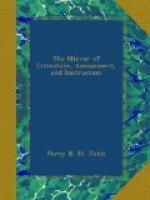Romford.
H.B.A.
* * * * *
THE NOVELIST.
* * * * *
ANNE OF GEIERSTEIN.
[The Literary Gazette of Saturday last enables us to present our readers, (almost entire) the following Legend respecting the house and ancestry of the heroine of Sir Walter Scott’s forthcoming Novel—Anne of Geierstein. The tale is entitled Donnerhugel’s Narrative, and was told by a remarkable Swiss to the English hero of the Romance.]
“I told you, (said Rudolf) that the lords of Arnheim, though from father to son they were notoriously addicted to secret studies, were, nevertheless, like the other German nobles, followers of war and the chase. This was peculiarly the case with Anne’s maternal grandfather, Herman of Arnheim, who prided himself on possessing a splendid stud of horses, and one steed in particular, the noblest ever known in these circles in Germany. I should make wild work were I to attempt the description of such an animal, so I will content myself with saying his colour was jet black, without a hair of white, either on his face or feet. For this reason, and the wildness of his disposition, his master had termed him Apollyon; a circumstance which was secretly considered as tending to sanction the evil reports which touched the house of Arnheim, being, it was said, the naming of a favourite animal after a foul fiend.
“It chanced, one November day, that the baron had been hunting in the forest, and did not reach home till night-fall. There were no guests with him, for, as I hinted to you before, the castle of Arnheim seldom received any other than those from whom its inhabitants hoped to gain augmentation of knowledge. The baron was seated alone in his hall, illuminated with cressets and torches. His one hand held a volume covered with characters unintelligible to all save himself. The other rested on the marble table, on which was placed a flask of Tokay wine. A page stood in respectful attendance near the bottom of the large and dim apartment, and no sound was heard save that of the night wind, when it sighed mournfully through the rusty coats of mail, and waved the tattered banners which were the tapestry of the feudal hall.




